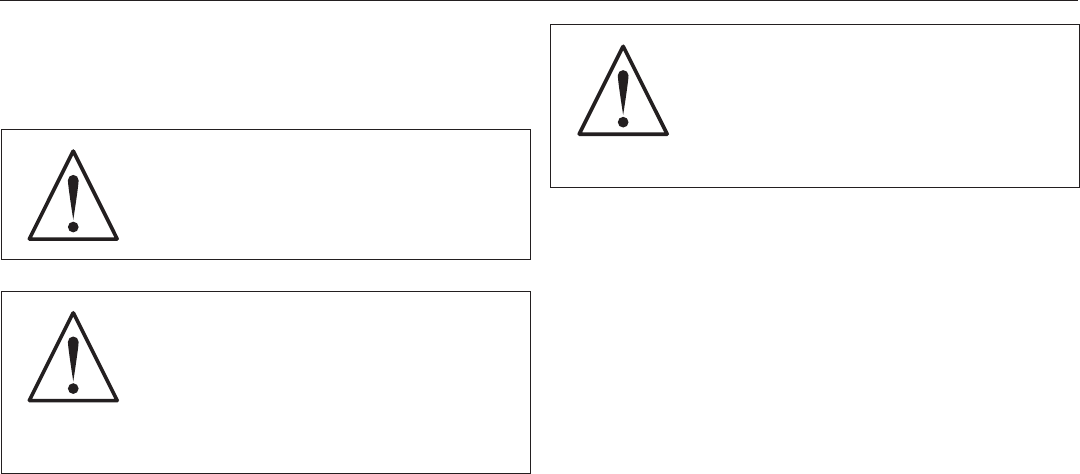
6
Buccaneer GT, Falcon GTE - Installation, Assembly & Servicing
INSTALLATION
2.5 Hydraulic Connections
Installation must be carried out following the regulations in force,
trade practices and the recommendations contained in this leaflet.
• Before making the hydraulic connections for the central
heating circuit, it is essential to flush the water system to
eliminate any dirt which may damage certain parts (safety
valve, pumps, flap valves . . .)
• Be careful to isolate hydraulically the primary and secondary
circuits using stop valves. This will facilitate matters during
maintenance.
Inclusion of these valves means that maintenance of the
unit and its parts can be carried out without having to empty
it. They also mean that the tank can be carried out without
having to empty it. They also mean that the tank can be
isolated whilst a watertight pressure test is carried out if the
test pressure is above the pressure admitted by the tank.
2.6 Connection of the Domestic Hot Water
Circuit
The domestic hot water units can operate under a maximum service
pressure of 10 bar. Generally, they operate at 7 bar.
• Before connecting the domestic hot water circuit, the
pipework must be flushed to wash out any metal or other dirt
which could damage certain parts (safety units, pump, valves
. . .).
• The connection between the safety valve and the unit must
not contain any section parts. Also, the flow pipe for the
safety valve must not be obstructed. If the supply pressure
exceeds 5.5 bar, a pressure reducer must be included
"upstream" of the tank. It is advisable to site the pressure
reducer "downflow" of the water meter so as to have the
same pressure in all the pipes.
• Include a drain valve in the boiler as well as a "syphon funnel"
for the safety unit.
• Connection to the cold water supply must be carried out
according to the drawing in section 2.8. Components must
conform to the standards and regulations in force. A stop
valve is installed into the cold water supply.
WARNING
If the distribution pipework is in copper, a sleeve
in steel, cast iron or insulating material must be
placed between the hot water outlet of the unit
and this pipework so as to avoid any corrosion at
the level of the branch pipe.
WARNING
There must be no obstructions, complete or
partial, between the boiler and the safety valves.
WARNING
Heating installations must be designed and
assembled so that central heating water and any
products introduced into it cannot find their way
into the drinking water system. A removable
connection must be installed for filling the heating
circuit according to current regulations.
Notes:
- The safety unit and its connection to the tank must be at
least of the same diameter as the tanks sanitary cold water
supply pipework (minimum
3
/4").
- The safety unit's outlet pipe must have sufficient, continuous
slope and its section must be at least equal to that of the
orifice for the safety unit outlet (so as to avoid slowing down
the water flow when there is an excess of pressure).
- The level of the safety unit must be below that of the cold
water inlet so it can be drained. If this is not the case, install
a draining pipe at the lowest point of the tank (see drawing
in Section 2.8).
- To ensure hot water as soon as the taps are opened, a
circulation loop between the mains supply and the re-
circulation pipes of the unit can be installed.
2.7 Important Recommendations for
Connecting the Boiler to the Heating
Circuit and the Drinking Water Supply
The installation shall be made in keeping with applicable regulations
and codes of practice and the recommendations contained in these
instructions.
The expansion vessel shall be connected to the boiler without any
valve or stop valve between the boiler and the expansion vessel.
The heating system shall be designed and installed in a way as to
prevent the water from the heating circuit and any substances added
to it from flowing back into the drinking water circuit located before
it. The installation shall not be directly connected to the drinking
water system.
As a general rule, a check valve shall be fitted on the cold water
supply pipe.
VERY IMPORTANT: under safety rules, a sealed safety valve
calibrated to 7 bar shall be fitted on the cold water intake pipe
of the hot water tank. We recommend membrane type hydraulic
safety devices with the NF mark.
During normal valve operation some drops of water are lost each
time the water is heated. This apparent leak is not only normal, but
is actually a sign that the valve is operating correctly.
The safety valve shall always be placed on the cold water supply
pipe and no valve or tap shall be fitted between the safety valve
and the tank.
In order to ensure the continuous circulation of hot water in the
installation and be able to draw hot water as soon as a tap is opened,
a circulation loop may be installed between the drawing points and
the tank recirculation tube. A non return valve shall be fitted on this
loop.


















